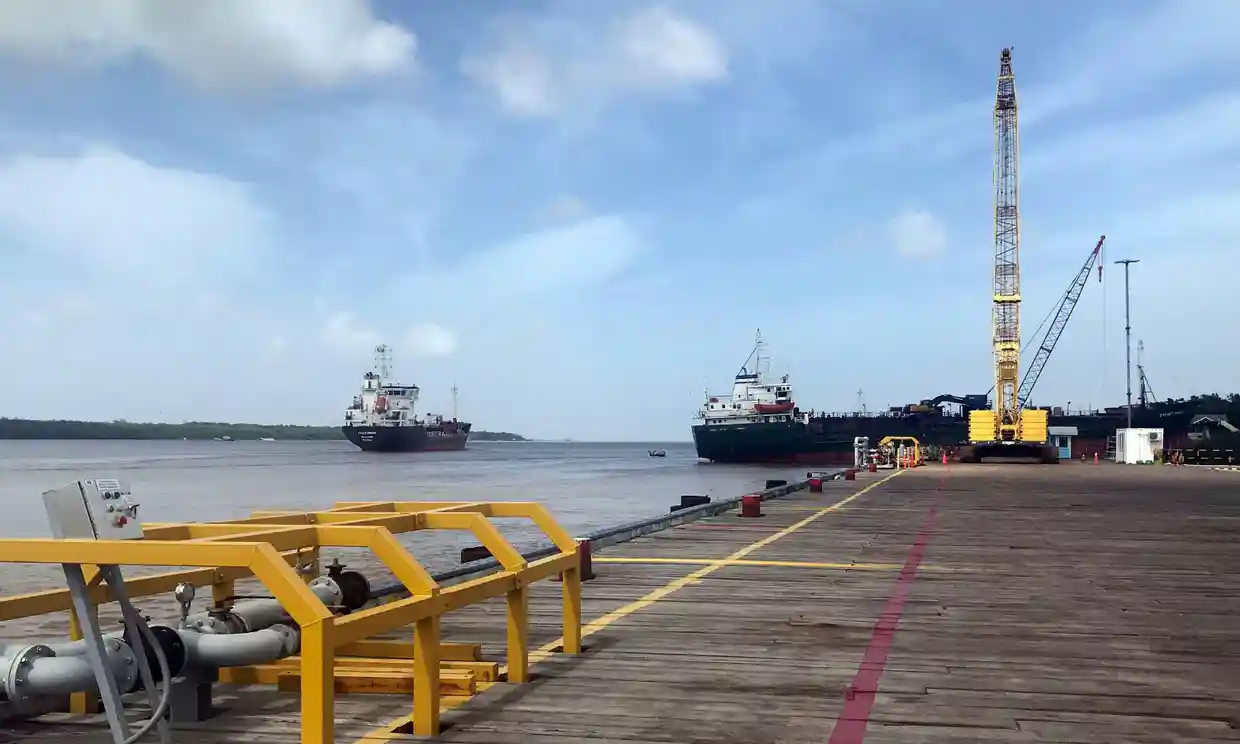Guyana to seek better royalties and terms for future oil contracts
Country’s vice-president’s remarks after investigation highlighted concerns about ExxonMobil deal

Published in the Guardian
Guyana will seek much better terms for any future oil deals than their contract with ExxonMobil, the country’s vice president said on Tuesday.
The tiny South American country has become one of the most desired oil exploration spots after an ExxonMobil-led group, which also includes the U.S.-based exploration firm Hess Corp. and the Chinese oil company CNOOC, discovered about 9 billion barrels of recoverable oil and gas off the coast.
But a Guardian-Floodlight investigation on Tuesday highlighted concerns about both the terms of the deal and the environmental consequences for Guyana.
The investigation quoted industry analysts at IHS Markit who said the Guyanese government was receiving a below-average return on ExxonMobil’s projects. The company receives more than 85% of the proceeds, as a result of the government and public largely “absorbing Exxon’s costs,” according to the Institute for Energy Economics and Financial Analysis (IEEFA).
ExxonMobil said the deal would continue to generate billions of dollars of revenue for Guyana. Yet the investigation found its government had reported it made just $309 millionfrom the projects since they began, while ExxonMobil and its partners had brought in roughly $1.8 billion, according to Tom Sanzillo, director of financial analysis at the IEEFA.
Guyana will aim to increase its oil royalties and revamp other contract terms as part of a new profit-sharing agreement (PSA) for future crude and gas projects now in its draft stage. It expects to install an energy regulatory body this month and will disclose the winner of a one-year contract to market of oil production from the Stabroek block, which is located about 120 miles off Guyana.
The new PSA will be tougher than that negotiated with the ExxonMobil consortium and could be ready “within six months or so,” said Guyana’s vice president, Bharrat Jagdeo, on the sidelines of the Offshore Technology conference in Houston, according to Reuters.
ExxonMobil had told the Guardian: “The terms of the contracts are competitive with other agreements signed in countries at a similar resource development phase. Our work and the support of the government of Guyana are the basis of a long-term mutually-beneficial relationship that has already created significant value for the people of Guyana.
“These resources are being brought on line at a record-pace for the industry, resulting in significant cost savings for the government and its industry partners as multiple developments are being processed.”
The government has been at odds with ExxonMobil over flaring at its Liza project, the first one producing crude in Guyana after discoveries.
“We have made it clear that in any new PSA we negotiate for those blocks, the conditions will be very, very different than the ones from the Stabroek block,” Jagdeo said, including higher royalties and mechanisms for deducting costs from investment.
Previous Guyanese governments have been criticized for the lucrative terms provided to companies involved in the Stabroek block.
“All the deficiencies of this contract will be addressed,” Jagdeo said.
In his conference presentation on Tuesday, Jagdeo pushed back against campaigners who were quoted in the Guardian/Floodlight investigation calling for Guyana to leave the oil in the ground, saying the calls were “totally unfair … because the world is going to continue to use fossil fuels in the future,” and Guyana should be allowed to benefit from this demand.
In the article, the investor advocacy group, As You Sow, criticized Exxon’s plans to open a massive new oil frontier in Guyana in the face of the International Energy Agency’s recent recommendations that there should be no investment in new fossil fuel supply.
But Jagdeo argued: “We’ll develop our oil industry, putting in place regulations for safe, low-carbon operations.”
He agreed with the argument in the Guardian that Guyana’s oil sector was being developed more rapidly than its ability to put in place the necessary capabilities and frameworks to ensure adequate oversight and management. And he detailed steps the government is now taking to increase its regulatory authority.
But, he added, “our policy is to get as much of the oil out of the ground as quickly as possible ... We have to make use of this resource while there’s still demand.”
ExxonMobil has been approached for comment.
Floodlight depends on a community of readers like you who are committed to supporting nonprofit investigative journalism. Donate to see more stories like this one.
